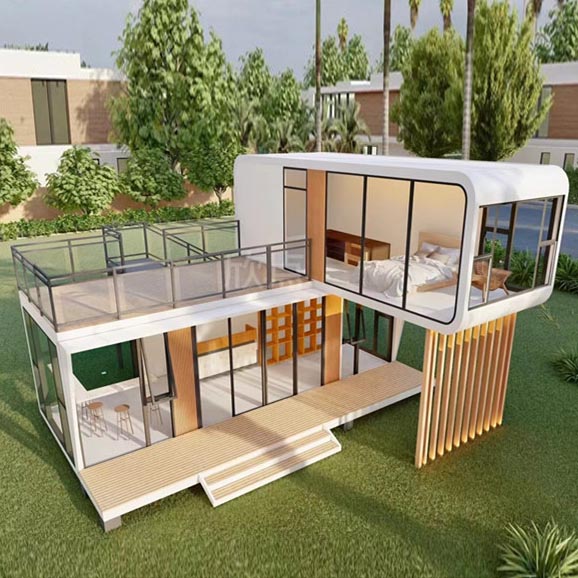What Makes a Residential Modular House a Smarter Housing Choice?
2025-09-17
The demand for affordable, sustainable, and efficient housing has grown dramatically in recent years. Rising land costs, increasing urban populations, and the need for faster project delivery have all pushed the construction sector to explore alternatives beyond conventional methods. One solution gaining significant attention is the residential modular house.
A residential modular house is a prefabricated structure built off-site in sections, or modules, within a controlled factory environment. Once completed, these modules are transported and assembled on the final site. Unlike traditional construction that can take months or even years, modular housing accelerates the timeline while ensuring consistent quality.
The appeal of residential modular houses lies in their balance between customization, efficiency, and long-term durability. Buyers no longer need to compromise between speed and quality. These homes are designed with strict compliance to building codes, often exceeding the structural strength of conventional housing. Moreover, the modular approach allows homeowners to tailor layouts, finishes, and features while benefiting from streamlined costs and eco-friendly processes.
For first-time buyers, families seeking extra space, or investors building rental units, modular houses provide an adaptable solution that combines modern comfort with practicality.
How Do Residential Modular Houses Work and What Sets Them Apart?
At the core of the modular approach is efficiency without compromise. The process begins with the design phase, where architects and engineers create standardized modules based on the buyer’s requirements. These modules are then manufactured in a climate-controlled environment, minimizing weather-related delays and quality inconsistencies.
Once completed, the modules are delivered to the site and assembled on a pre-prepared foundation. The final structure looks and functions the same as a traditional home, but the speed and precision of the process make it stand out.
Advantages Over Conventional Housing
-
Speed of Construction: Up to 50% faster than traditional building methods.
-
Quality Control: Built indoors, free from rain, wind, and temperature extremes that affect site-built structures.
-
Cost Predictability: Reduced labor hours and bulk material purchasing lower construction costs.
-
Environmental Benefits: Less waste, more energy-efficient designs, and sustainable materials.
-
Flexibility: Homes can be expanded, relocated, or adapted over time.
Product Parameters of Residential Modular Houses
| Parameter | Specification Range / Options |
|---|---|
| Structure Material | Steel frame, reinforced concrete, wood frame (depending on design) |
| External Finish | Brick cladding, composite panels, vinyl siding, customizable textures |
| Roof Types | Flat, pitched, gabled, or customized to local regulations |
| Insulation | EPS panels, PU foam, mineral wool for energy efficiency |
| Size Options | 40m² – 300m²+ (single-story or multi-story configurations) |
| Energy Features | Solar panel compatibility, double-glazed windows, energy-saving HVAC systems |
| Compliance | Meets international building codes (ISO, CE, or local standards) |
| Lifespan | 50+ years with proper maintenance |
These specifications highlight that modular housing is not a temporary fix but a long-term investment suitable for residential neighborhoods, suburban communities, or even rural areas where access to traditional building materials is limited.
Why Are More Homeowners Choosing Residential Modular Houses?
The shift toward modular housing is not just about cost savings; it reflects broader lifestyle and market changes. People value flexibility, sustainability, and the ability to move into a home faster without sacrificing comfort.
Key Reasons Driving Popularity
-
Affordability Without Sacrificing Quality
Modular homes often cost less than traditional houses due to shorter construction times and reduced labor expenses. Yet they maintain equal or higher quality standards, thanks to rigorous factory inspections. -
Customization Options
Buyers can choose layouts, flooring, kitchen styles, and even smart home technology packages. Unlike cookie-cutter developments, modular housing empowers homeowners with personal choice. -
Sustainability and Eco-Friendliness
By using prefabricated modules, material waste is minimized. Energy-efficient insulation and systems further reduce the environmental footprint. -
Adaptability for Different Needs
Families can start with a smaller layout and expand as needed. For investors, modular housing offers quick scalability in creating rental properties or vacation homes. -
Resilience and Durability
Built to withstand transportation and assembly, modular homes often exceed structural requirements, making them durable against weather and time.
Common FAQs About Residential Modular Houses
Q1: What is the lifespan of a residential modular house?
A: A well-constructed modular house can last over 50 years with regular maintenance. The materials used are the same as in conventional construction, ensuring structural integrity and long-term comfort. The controlled factory environment also guarantees precision, which helps the structure age gracefully.
Q2: What financing options are available for modular houses?
A: Modular homes qualify for most traditional mortgage loans, provided they are placed on permanent foundations. Banks and lenders treat them similarly to site-built houses, making financing accessible. In some regions, government incentives for sustainable housing may also apply.
What Does the Future Hold for Residential Modular Houses?
As cities grow and demand for affordable housing accelerates, residential modular houses are poised to play a vital role in shaping future living spaces. They align with the key priorities of governments, developers, and homeowners: affordability, efficiency, and sustainability.
Future Trends in Modular Housing
-
Smart Integration: Homes will increasingly feature smart appliances, energy monitoring systems, and automated climate control.
-
Green Construction: Solar roofs, rainwater harvesting, and advanced insulation materials will reduce environmental impact.
-
Urban Expansion: Modular housing will serve as a rapid solution for expanding urban housing stock without lengthy construction delays.
-
Disaster Relief and Relocation: Quick-to-deploy modular homes can provide immediate solutions in regions affected by natural disasters.
Why This Matters for Buyers
Choosing modular housing today is more than a financial decision—it is an investment in adaptability, efficiency, and long-term security. Whether building a family residence, a rental community, or a retirement retreat, modular solutions provide unmatched value.
At Cymdin, we deliver residential modular houses that combine innovation, comfort, and sustainability. Our solutions are tailored to meet diverse housing needs, backed by strict quality standards and professional service. We understand that a home is more than just walls and roofs—it is where life unfolds, memories are created, and futures are built.
For more details, personalized design options, or bulk project inquiries, we invite you to contact us and discover how Cymdin can help turn your housing vision into reality.



